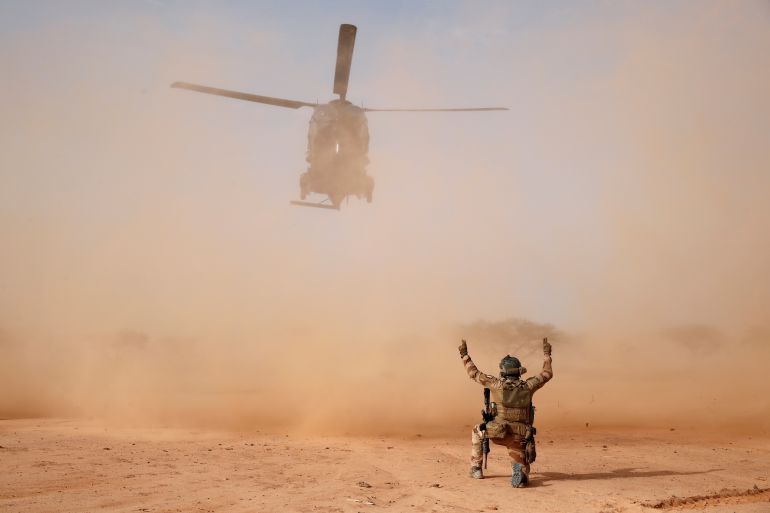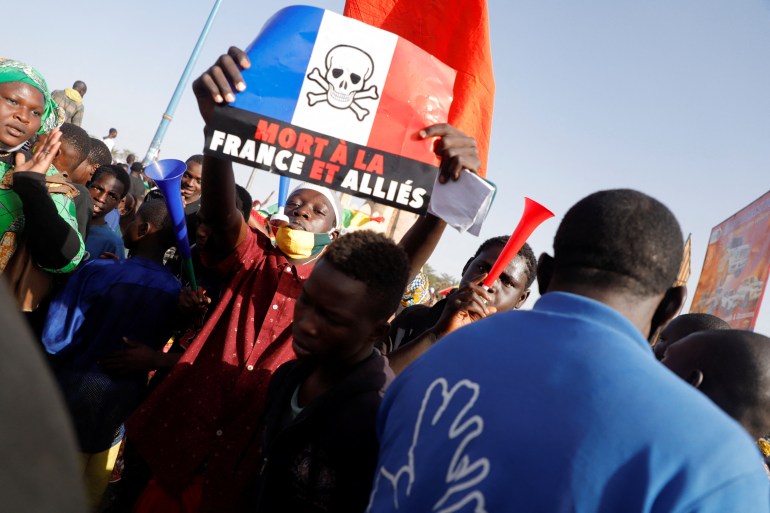Macron expected to announce French withdrawal from Mali
Withdrawal would mark a major strategic shift by France, which has had troops in Mali for nine years.

President Emmanuel Macron is expected to announce France will withdraw its forces from Mali, amid a breakdown in relations with the country’s military leaders.
Macron is expected to announce the decision this week, the Reuters and AFP news agencies reported, citing diplomatic and security sources. Reuters said the decision could be announced as early as Wednesday following a top-level meeting on the Sahel region of Africa in Paris. AFP said it was likely to be announced to coincide with a European Union-African Union summit in Brussels on Thursday and Friday.
Keep reading
list of 4 itemsThousands in Mali celebrate expulsion of French ambassador
EU imposes sanctions on senior Mali officials
Burkina Faso avoids further ECOWAS sanctions
The pullout from Mali, with a redeployment of forces to other countries in the region, amounts to a major strategic shift by France, ending a nine-year mission that successive French presidents had argued was crucial for regional and European security.
“If the conditions are no longer in place for us to be able to act in Mali – which is clearly the case – we will continue to fight terrorism side-by-side with Sahel countries who want it,” French Foreign Minister Jean-Yves Le Drian said on Monday.
There have been two coups in Mali since 2020 and ties have worsened since the military reneged on an agreement to organise elections in February and proposed holding onto power until 2025. The regime has also developed closer ties with Russia, including turning to suspected mercenaries from Russia’s private military contractor Wagner, and this month expelled the French ambassador.
“Tomorrow evening (Wednesday), there will be a meeting between the French president and the heads of the states of partner countries to our presence in the Sahel region in the fight against terrorism,” French government spokesman Gabriel Attal told reporters.
He declined to say whether a decision had been made on withdrawing forces other than to say it would be taken in consultation with European and African partners.

A French withdrawal would mean the European special forces Takuba task force would also leave.
A draft document of the plan seen by Reuters, distributed to countries involved in Mali, says that France and its Takuba partners had “decided to commence the coordinated withdrawal of their military resources from Malian territory”.
“It’s no longer a question of if they leave, but what happens with the troops, what happens to the UN peacekeeping force and what happens to the European Union missions,” a senior European diplomat told the news agency.
Shift in focus
A French presidency official said the idea would be to reduce troops and cooperate exclusively with countries that wanted help.
France has already withdrawn some troops in the Sahel intending to reduce numbers from about 5,000 to 2,500-3,000 by 2023. About half of its forces are based in Mali.
The Takuba mission has about 600 to 900 troops, of which 40 percent are French, and includes medical and logistical teams.
The draft document does not call on countries involved in the 14,000-strong UN peacekeeping mission (MINUSMA) or the EU’s EUTM (European Union Training Mission) and EUCAP missions to withdraw. However, their future is in doubt given French forces provide medical, aerial and reassurance support.
Spanish Foreign Minister Jose Manuel Albares, whose country represents the largest contingent in the EUTM, said the reasons for Europe’s engagement in the region still exist.
European governments fear that shifting relationships with the region’s rulers risk leaving a vacuum for movements tied to al-Qaeda and ISIS/ISIL.
In addition to Mali, Burkina Faso and Guinea Bissau have seen recent military coups.
“Spain will make its voice heard at the EU. We believe the reasons that brought us to Mali are still there – instability, jihadism,” he said.
“It is desirable for us to maintain a mission.”